Are you a Si-User or a Ni-User? The Difference Between Introverted Sensing and Introverted Intuition
So you’ve figured out your personality type and you’re anxious to know more! But all of the sudden you’re hearing words like Si and Ni and Fi and Fe. What does all this mean? The deeper you look the more confusing it may seem. At first, you may have just thought you were an introvert with a preference for sensing and feeling, but now you’re seeing words like Introverted Sensing and Extraverted Sensing, or Introverted and Extraverted Feeling. You may also be unsure of your type. Perhaps you feel torn between sensing and intuition and aren’t sure which one resonates more with you.
Two of the most confusing functions to explain are Introverted Sensing and Introverted Intuition. These functions are referred to as Si (Introverted Sensing) and Ni (Introverted Intuition). If you’re an ISFJ or an ISTJ you would be called Si-dominant. If you’re an INFJ or an INTJ you’d be called Ni-dominant. These preferences create major differences in how these four types view the world.
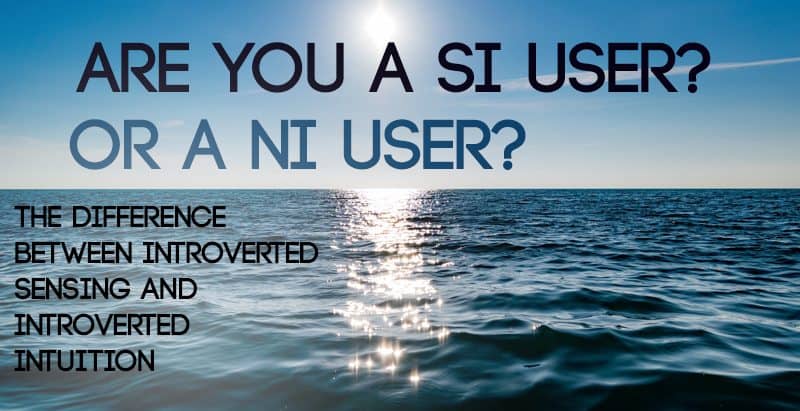
Table of contents
Estimated reading time: 9 minutes
Intuition and Sensing as Perceiving Functions
Each personality type has a favorite perceiving function and a favorite judging function. The perceiving function determines how we absorb information and which things we notice and trust. The judging function determines what we consider when we make decisions. SJ types prefer to absorb information through Introverted Sensing, while NJ types prefer to absorb information through Introverted Intuition.
Characteristics of Si-Dominant Types:
- They are keenly aware of all the details around them
- They are down-to-earth and outwardly matter-of-fact
- They absorb and place importance on proven facts, which they can recall swiftly
- They tend to be hard-working and responsible
- They have a respect for history and traditions
- They enjoy tried-and-true techniques
- They focus on what already exists and prefer to deal with concrete realities, facts, and examples
- They form future forecasts based on what they’ve learned through personal experience
- They are considered the most practical of all the introverted types (according to Isabel Briggs Myers research in her book Gifts Differing)
- They thrive on routine and like to know what to expect
- They are very detail-oriented and attentive, but can be less aware of “the big picture”
- They are very aware of inner body sensations like hunger or illness
- They tend to be careful with money
- They are often described as “conservative,” “practical,” or “level-headed”
Characteristics of Ni-Dominant Types:
- They are single-minded
- They are individualistic and independent
- They are driven by an inner vision of how things could play out in the future
- They focus on potential and deal with abstract concepts, symbols, archetypes, and ideas
- They are determined to discover and pioneer new roads and unveil new research. The tried-and-true technique bores them
- They tend to find the routine and practical day-to-day aspects of life mundane
- They keep a constant eye on the big picture and are less aware of all the details
- They are tirelessly driven by their inspirations and long to innovate
- They have keen insights into the deeper meanings of things
- They are very strategic and can easily piece clues together
- They look for patterns and hidden meanings
- They are often referred to as “visionary” or “grandiose”
How the Introverted Sensor Thinks
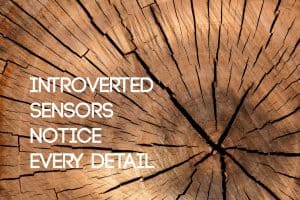
Introverted sensors have a vast memory bank of stored impressions, facts, and details that give them unshakeable ideas and viewpoints. Si-dominant personality types can easily recall details and experiences from the past and then they use this information in combination with their judging process (thinking or feeling) to make decisions. Si-dominant types are not impulsive, but careful in all their decisions. They consider what they’ve learned, from mistakes, from memory, from their education, and they take all that accumulated knowledge and apply it to their decisions. They create stability for the people in their lives and crave stability in their own lives. They enjoy having a routine, and they find comfort and joy in traditions they can count on.
The Si-dominant individual instantly compares current data to past information. When they learn new things they immediately scrutinize the new information against a vast storehouse of information they’ve accumulated in the past. Offenses, slights, kind deeds, these things are rarely forgotten. For this reason, Si-users place great importance on keeping their word and forming relationships with people who keep their word and are consistent and dependable. Si-users believe in being responsible, in following through and completing projects, and they tend to be rattled by change and unpredictable or unfamiliar situations because they can’t compare these situations to past collected data.
Introverted Sensors pay attention to concrete details and facts. If you show them a piece of artwork and ask them what they noticed, they will likely point out all the physical details (“I saw three tall pine trees, the sky was bluish-purple, there is a woman standing on edge of the mountain wearing a blue dress”). The Ni-user is more likely to get an overall impression of what the image might symbolize (“This picture is about escape”, “This woman is considering jumping off the edge of that mountain”, “there’s something ominous about the dark color of the pine trees and the way the woman is looking into the distance”).
If you’re trying to make a decision about something but are unsure about the facts and details involved, you’ll want to talk to a Si-dominant personality type. They can easily pull from their memories to give you all the details that are so necessary to know before deciding what step to take next. They aren’t the types to make forgetful blunders because they are very careful, responsible, and attentive to all the practical facts needed to support a decision.
What Si-Users Trust:
Introverted Sensors trust what they can see, touch, taste, smell, or what they know through experience. They also trust authorities and place value in credentials. They especially trust their own past experiences.
How the Introverted Intuitive Thinks

Ni-dominant personality types (INTJs and INFJs) have advanced insight and awareness of patterns and underlying meanings. They can quickly understand complex or abstract concepts, but may have a harder time remembering concrete, sensory details (as Si-dominant types would). Where the Introverted Sensor focuses on what “is” the Introverted Intuitive focuses on what lies “behind the curtain.” This is why Si-users are more likely to take things at face value, whereas Ni-users are more likely to read between the lines. Exceptions to this occur when Si-users have a reason related to the past where they may need to distrust something someone is saying (example: “This person has lied to me before, so I need to read more deeply into what this person is saying now”).
Introverted Intuitives focus much more on the future than Introverted Sensors do. Ni-dominant types are always looking ahead, trying to determine what will be. They do far less comparing and contrasting with past experiences, and are less fond of “tried-and-true” techniques. They are less interested in authority, credentials, and past experience, and are more interested in finding a new pathway or manner of doing something that has never been done before. This isn’t to say they don’t learn from the past or trust anyone in authority, but they don’t trust the past as readily as a Si-user would. They are naturally skeptical of authorities or what is accepted as the standard. They are more driven to find their own way to knowledge and progress.
I like to think of the Si-users brain as a collection of filing cabinets, neatly labeled, filled with very precise and detailed concrete information. I think of the Ni-user’s brain as a giant collection of puzzle pieces, each one seemingly meaningless, but when connected properly forming an astounding insight into the future. Both the Si-user and the Ni-user need to have a little pause of alone time to access either their filing cabinet or put together their puzzle, and the Si-users information will be more concrete and practical whereas the Ni-user is going to veer more towards insightful and visionary.
Introverted Intuitives are keenly aware of patterns, trends, symbols, and hidden meanings. They can pick up on a multitude of clues that other people might ignore, and they frequently surprise people with their “aha” revelations about the future. Ni-dominants are incredibly strategic people, and love to plan out all the little steps that can be taken to meet their one “master plan”. They can easily see how events will unfold and are often one-step-ahead of others when it comes to knowing what will happen in the future.
If you want to know how your current choices may play out someday, talk to an INTJ or an INFJ. You can tell them all the details, the actions you have been taking, and they will tell you what the future implications are. This is easy for them, it’s their “master skill” in a way.
Introverted Intuitives are the ultimate “big picture” thinkers, looking for the ultimate truth and meaning behind everything. The Si-user is more likely to miss seeing the forest for the trees, and the Ni-user is more likely to miss seeing the individual trees because of the forest. Introverted Sensing is about memories and details, and Introverted Intuition is about impressions and meanings.
What Ni-Users Trust:
Where Si-users trust what they know through experience and what is concrete, Ni-users trust patterns, underlying themes, impressions, and symbols. They just “know” things intuitively and they hold to these insights with unshakable resolve. This isn’t to say they are illogical, both INTJs and INFJs have a strong sense of logic. They will both test their insights against logic after they have had them. However, they have a stronger belief in the “impossible” or the existential than Si-users tend to have.
Is One Type Better Than the Other?
Absolutely not! We need sensors to remind us of what is real, what makes the most practical sense, and to help us keep track of details that intuitives are more likely to miss. We need them to retain information from history and uphold positive traditions. We need intuitives to grasp what things mean for the future, to strategize, and to unlock new discoveries about the meaning of the universe and “the big picture.” Both types are equally vital to humanity and each has its own unique abilities that should be admired.
Feel Like Sharing Your Thoughts?
I’d love to hear from you in the comments!
Find out more about your personality type in our eBooks, Discovering You: Unlocking the Power of Personality Type, The INFJ – Understanding the Mystic, and The INFP – Understanding the Dreamer. You can also connect with me via Facebook, Instagram, or Twitter!

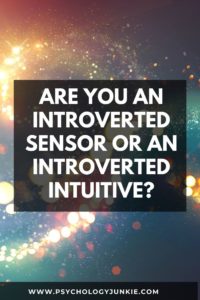


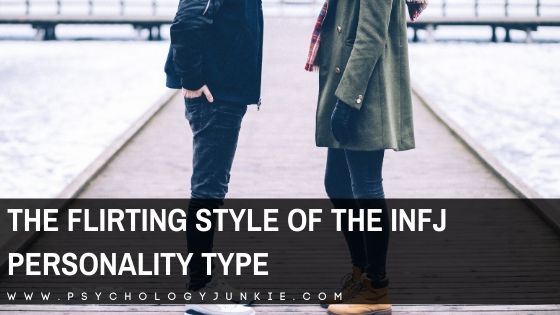


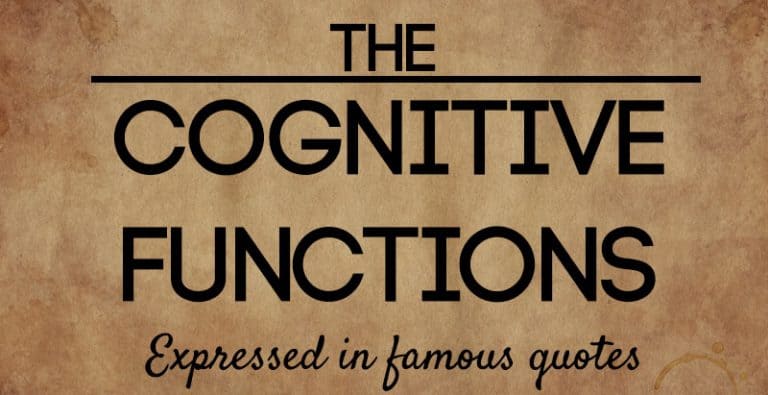
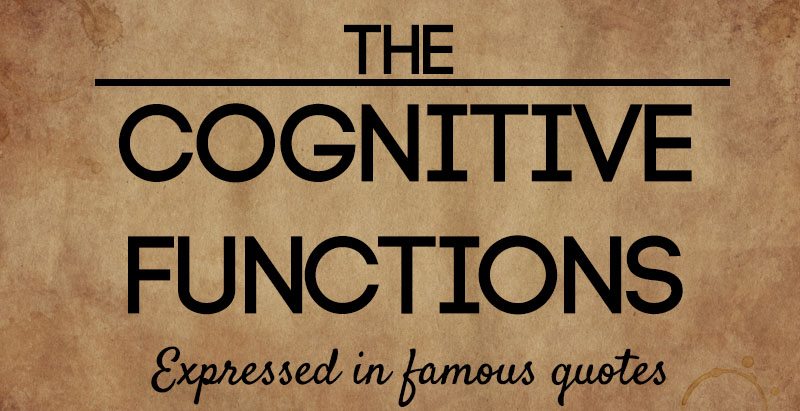



Hello, my name is Kimberley. I have a question, or 12. I have taken the MB test twice. Once for a job & again online, most recently. Both times I received the same results. My “N” was scored at 54 & my “S” scored at 46. My “I-T-J” were all scored 97 or higher.
What does it mean that my N & S are scored so closely, other than I use both of them.
Reading about both of them gets confusing & I get the feeling that i dont even fit in with the weirdos sometimes, because im even weirder than they are, lol!!
How often does this happen & what does it mean about my personality & how i put things together? Is this why it is so hard for me to make decisions sometimes & other times I make compulsive decisions?
This is the only article I have found that compares the two “N” & “S”. I have yet to find any about if the scores are not “hard” & you lie between two designations. Any information or insight would be greatly appreciated!!
Thank you,
Kimberley
I’m the same way (S and N very close in percentages) while I-T-J very high. When I do MB testing, it shows me as an INTJ yet I feel that ISTJ also fits. Also looking for further insight into how the S or N functionality works. ie maybe under stress I flip from INTJ to ISTJ?
I love this article! I’m an ISTJ and my husband is INTJ so it’s always neat reading about the differences in our dominant functions. I know we tend to annoy each other when I bring up a detail from 5 years ago or he’s talking in the abstract, but this also how we help compliment each other. He comes up with grand plans and I help execute on them. This has worked well for us many times. I’ve often described my mind as a filing cabinet with neatly organized folders. It always amazes me too when we’re talking about something and he’ll just whip off with some ‘random’ comment when I’m trying to focus on concrete details. Such as, I was wearing some bee socks and the bee has a face. We’re talking about something and then he just says “it looks like he’s in excruciating pain.” Say what?! Who’s in pain and where and when? He’d glanced at my socks while we’re talking and was coming to a conclusion (like you mentioned above) about what he saw. Personalities are fascinating! Thanks for sharing this article with us.
I’m a 17yr old guy (kid?). My personality test gives me a result with an high amount of I-T-J percentages, but the S/N dilemma is really kind of confusing to me. The test said I slightly prefer Intuition over Sensing (If you want to know the scores, Intuition has 52 and Sensing has 48). I’m not sure how to type myself, an ISTJ or INTJ?
I refuse to believe I’m an INTJ to the core (despite it being really cool-sounding but that would be a false claim if I turn out to be otherwise), and what would be more realistic that it would be somewhere closer to ISTJ; although I really think of abstract topics just out of nowhere, even when I’m doing stuff that I’m supposed to do by the routine. (like going on a tangent while studying and doing kind of non-practical equation solving to ensure something is correct, mathematically and theoretically instead of just accepting that it is observed in the nature. It kind of irks me when textbooks claim that, to be honest. Lot of times there are exceptions, and I can’t help but accept the experimental stuff, as theories are never perfect.)
Some of the qualities you mentioned about INTJs and ISTJs in the article, are kind of common with me. It’s like having qualities of both type in a person. I can’t help but feel like the qualities were mentioned from a stereotypical standpoint and that’s why I’m unable to relate completely to a single type. Stereotypes are never always same to the actual observation, making them as accurate as a theory can be. But still, I enjoy reading this and I do want to know what type I actually am. Believe me, I’m researching (nothing grandiose, just browsing and trying to encounter some genuine articles instead of memes which I love by the way) about this for almost two months now.
Any heads-up would be amazing, by the way. I love clarifications, and I hate not knowing. Lol
Hi! It can be SO hard, so I don’t blame you for feeling a little frustrated. I wrote an article to help differentiate between ISTJ and INTJ once. It might help! Here it is:
https://www.psychologyjunkie.com/2017/06/23/istj-intj-clarifying-common-mistype/
Following Hurricane Irma, which hit the Caribbean island my family has financial investments on, I as an INFJ have lost my ability to be ‘determined and single-minded.” I have found myself being like my ESFP sister, who often is ‘scatter-brained and indecisive.” With so many things going on, she does none of them. I often help her with things. Talking to people I was like ‘ah ah ah’ – slow to make a point, ungalvanized. I guess there are seasons for things, and being single minded is one of them. I’ve been letting things go lately. My chores are mounting up; I haven’t written them down. I feel so behind now; I’ve lost track. The wind has been knocked out of my sails. Where as ‘determined and single-minded’ for me means being proactive, lately I’ve just been ‘towing the line.’
I hope things get better for you soon!
As an INFJ, also having one of my closests friend veing INFJ aswell.
Being determined and single-minded is not close to being us. Actually more of the opposite. Twisting and turning to see everything from different angles and perspectives, makes it just so much more difficult to be determined of something. Everything/most (intresting) is just so complexed.
Thanks for a good intresting read.
Magnus
I’m a Ni user, but trust me when I say so, I like things organized too (Si). I want to be so organized with all the waypoints set, that all the GPS has to do is steer the boat from A to B to C, while I sit in the cockpit and relax.
Introverted intuition is the ambient processing of information over time for the identification of trends and patterns, and ultimately formulation of predictions of the distant future. Introverted sensing retains memories as perennial images, crystalline in persuasion, and absolute in authority.
When facing uncertainties Si users will find consolation in the past, believing what has worked before will always work. Conversely Ni users see the intangible glue holding everything together. This glue, for lack of a better description, is the existential dark matter which constructs reality yet can not be directly experienced. By observing patterns and connecting seemingly unrelated events/ objects, the Ni user is able to visualize the unseen, which guides their premonitions. Everything we see is generated by abstract processes. Concrete reality is a mere symptom of invisible machinations. We can only make sense of the veil of reality if we consider the underlying lattice on which it is spread. This lattice work is the patterns and abstract concepts which hold everything together. (This is really hard to explain as I do it naturally as a centipede coordinates its appendages ‘intuitively’.)
I find an easy way to identify Ni or Si function is in the description of one’s ‘happy place’. A Si user would likely dwell on a pleasant memory, or a time period, and access this ‘memory’ whenever they are distressed. Personally I prefer to contemplate the vastness of the future. I see indeterminable information growing as coralline trees, converging through perspective (a metaphor for time) into multiple singularities which represent potential future events. I let my intuition guide me through this endless forest of information and discover how the future will play out. I ask why things worked in the past, not what. By asking ‘why’ I can devise what will work in the future and for eternity.
Thank you for this article! I was unsure whether I was INTJ or ISTJ, but this showed me that I definitely prefer Ni over Si, yet I also have a strong Si for an INTJ.
@Kimberly
Somebody correct me if I’m wrong, but here is what I know.
INTJs I have known in my life graduated honor students in college LOL 😂. Some of them whom I have seen taking the MBTI test scored N & S almost equally same as yours, maybe because of the logical, efficient traits of INTJ that might be mistaken to be Sensing.
To know whether you’re an ISTJ or INTJ, you might want to consider knowing your inferior function.
INxJs have Inferior (Se) Extraverted Sensing, this is what makes them insecure about how they look, how they sound, how they smell; anything that can be perceived through external sensations ;generally they are afraid that they might give a bad experience to the people around them caused by unsatisfactory or unpleasant external sensations that comes from them.
Almost all INxJs appear and sound meek to the people around, they display this demeanor as they want to play safe, and again, avoid giving a bad experience.
Having deficient (Se) Extraverted Sensing is also where the performance anxiety or low confidence of INxJs coming from.
So, if these things manifest to you (deficient Se) then you’re quite right you are an Ni-dominant; INFJ or INTJ.
The aforementioned are just my personal experiences on how inferior extraverted sensing manifested. You can research, there are lots of information to know more about the inferior function 🙂 Cheers!